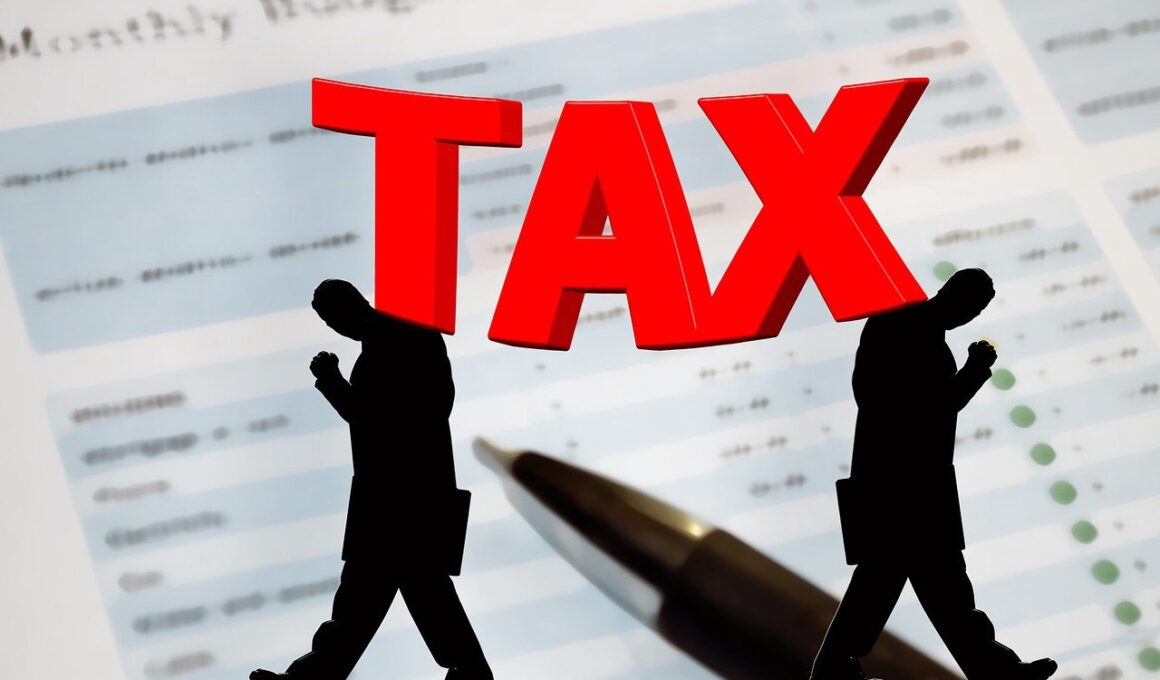Strategies for Minimizing State and Local Taxes
Effective tax planning is essential to maximize your financial health. By implementing thorough strategies, you can significantly minimize your state and local taxes each year. Start by reviewing your state’s tax laws, as they vary widely. For instance, some states offer tax credits and deductions that can lower your tax burden. Secondly, consider relocating to a state with lower tax rates. This might involve weighing the advantages of a more favorable tax environment against personal ties. Additionally, leverage retirement accounts like IRAs or 401(k)s, which can defer taxes until withdrawal during retirement. Make sure to research the specifics, as many states have varying regulations. Working with a financial advisor or tax professional can provide valuable insights into your specific situation. They can help identify opportunities that are easy to overlook. Furthermore, stay informed about changes in tax legislation, as these can impact your obligations. Planning for estimated tax payments can also help avoid penalties by ensuring compliance ahead of deadlines. Ultimately, tax planning is a continuous process that requires awareness and adaptation to new laws and personal financial changes.
Consider taking advantage of tax credits offered at the local and state levels. Many states provide various credits designed for specific groups such as low-income families, businesses investing in the community, and individuals who meet certain criteria. These credits directly reduce your tax obligations, making them particularly beneficial. Moreover, property taxes represent a significant expense that can potentially be reduced. Research local exemptions and relief programs that might apply to your situation, such as homestead exemptions that substantially lower your taxable property value. Engaging in community service or maintaining a residence in low-income areas may also attract additional tax breaks. Another effective strategy is to bunch deductions. This involves combining some expenses into one tax year to exceed the standard deduction. For example, consider prepaying property taxes or making additional charitable contributions in one year. Furthermore, analyze your investment choices carefully, as capital gains taxes can heavily impact overall financial outcomes. Opting for tax-advantaged accounts for investments is often well worth consideration. In essence, proactive planning and educating yourself on these available options can lead to significant tax savings annually.
The Importance of Proper Record Keeping
Proper record keeping cannot be overlooked when minimizing taxes. Maintaining accurate and detailed records is crucial for substantiating deductions and credits claimed on your tax returns. Organized documents help avoid potential issues with tax authorities. Start by keeping receipts for deductible expenses, including home office costs, medical expenses, and donations. Utilize electronic tools or applications to track expenses regularly, ensuring you capture all possible deductions. Additionally, maintain a file system categorizing your documents for easy retrieval later on. Don’t forget to save your previous years’ tax returns, as they can provide insights and help in claiming carryover deductions or losses. Furthermore, understanding what documentation your state requires can vary, so refer to your state’s tax website for detailed information. Regularly updating your financial records also assists in better assessing your overall tax position throughout the year. When it comes time to file, having organized records saves time and reduces stress. Lastly, consider scheduling regular check-ins with your tax professional, as they can advise on any changes or new opportunities to optimize your tax strategy effectively.
Another strategy for reducing your tax liability is to invest in a Health Savings Account (HSA) if eligible. Contributions to HSAs are tax-deductible, and withdrawals for qualified medical expenses are tax-free. This can effectively lower your taxable income while providing funds for qualified health costs. Furthermore, be aware of the possibility of a Flexible Spending Account (FSA) through your employer. Similar to an HSA, an FSA allows you to utilize pre-tax dollars for eligible expenses, effectively reducing your taxable earnings. Take advantage of these dynamically beneficial accounts as part of a comprehensive financial plan. Additionally, consider making tax-efficient investments, such as municipal bonds. The interest earned on these bonds is often exempt from federal tax and may be exempt from state taxes too, depending on the issuer. Furthermore, aim to optimize investment strategies, such as holding onto investments longer to benefit from lower long-term capital gains rates. Overall, several financial products aid in decreasing taxable income, allowing you to strategically minimize state and local taxes while maximizing your wealth simultaneously.
Year-Round Tax Planning
Cultivating a mindset of year-round tax planning is vital for ongoing tax minimization. This means reviewing your financial circumstances regularly rather than waiting until tax season. Stay informed about any upcoming changes in tax laws that could affect your finances. Keeping up with fiscal policy changes allows you to adapt your strategy effectively throughout the year. Moreover, assess your tax situation quarterly to determine if adjustments are necessary. Pay close attention to how various life events, such as marriage, homeownership, or having children, impact your tax liability. Situations like significant income changes require reassessment of your tax bracket, leading to potential tax saving opportunities. Lastly, aim to minimalize taxable events as much as possible. For instance, avoid cashing out retirement accounts unless necessary, as this can lead to substantial tax liabilities. Also, consider strategies for offsetting income with losses through tax-loss harvesting. The combination of active monitoring and proactive adjustments enables individuals to minimize taxes, making it more seamless to implement effective financial decisions consistently. Regularly dialogue with your financial advisor is essential to this ongoing process.
When exploring strategies to minimize state and local taxes, it’s critical to consider business-related deductions if you own a business. This may include deductions for home office space, equipment, and business-related travel. Be sure to document every expense, as businesses have the potential for substantial write-offs. Another area worth exploring is the opportunity to join professional organizations or trade groups, often providing access to exclusive tax breaks, resources, and networking opportunities within your industry. Likewise, ensuring that the business operates efficiently can also lead to minimized tax implications. Evaluate tax implications of employee benefits, as these can directly impact tax situations. For example, health insurance premiums paid through the company may provide tax advantages. Moreover, consider different business structures, like S Corporations or LLCs. Each structure has unique tax implications that can favorably impact your overall tax liability. Ultimately, optimizing a business structure requires careful analysis and professional advice. This combined focus on operational efficiency and tax strategy can significantly enhance your business in multiple ways, leading to lower tax burdens while supporting growth and sustainability.
Conclusion: Taking Action
In conclusion, minimizing state and local taxes is a crucial financial strategy that everyone can benefit from. Proactive planning, staying informed about tax laws, and being systematic in record keeping are key components of this process. Additionally, consider investment and savings vehicles that provide tax advantages, which can significantly enhance overall financial health. Moreover, addressing tax liabilities year-round rather than solely during tax season sets a solid foundation for minimizing obligations effectively. Cultivating awareness of potential deductions and credits is also instrumental, along with exploring various business-related tax strategies if applicable. It’s essential to remain engaged in discussions with knowledgeable tax advisors to optimize your plan continuously. Taking charge of your tax strategy isn’t just about compliance; it also relates to building sustainable wealth. By integrating these strategies into your daily financial practices, you structure your approach and position yourself for potential savings each tax year. A vigilant strategy combined with a willingness to adapt will yield fruitful results, lowering your state and local tax obligations while improving your overall financial well-being.


